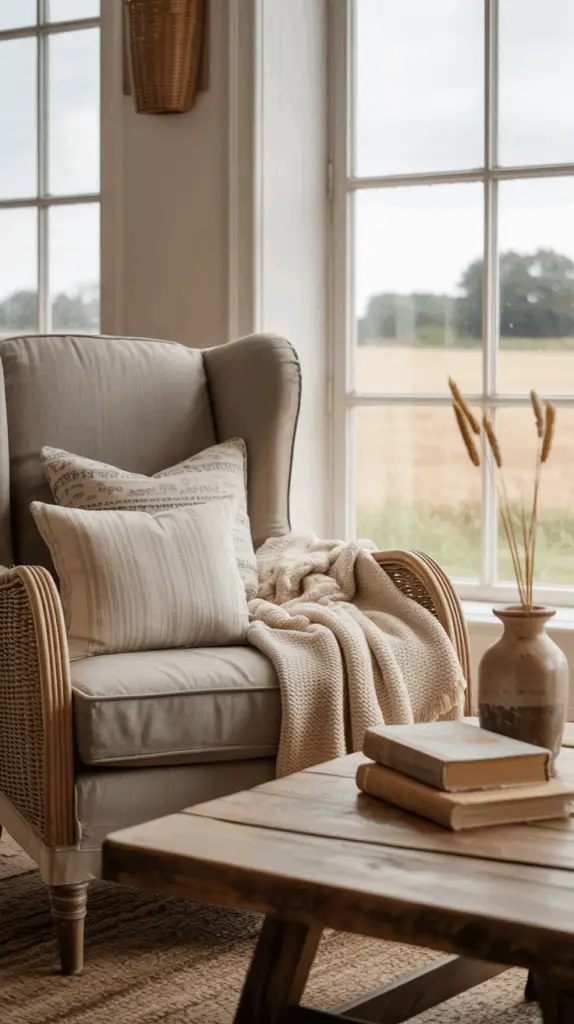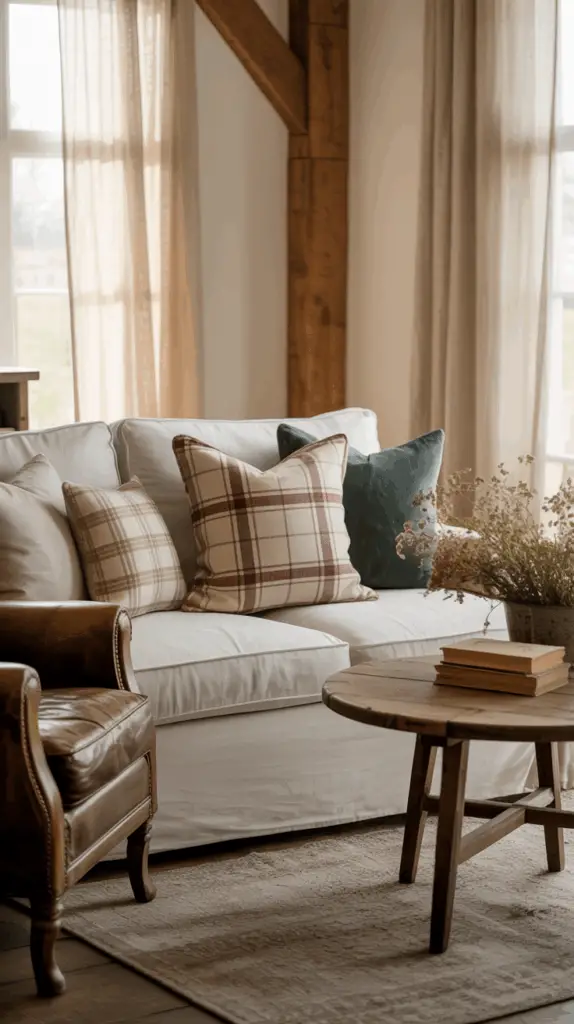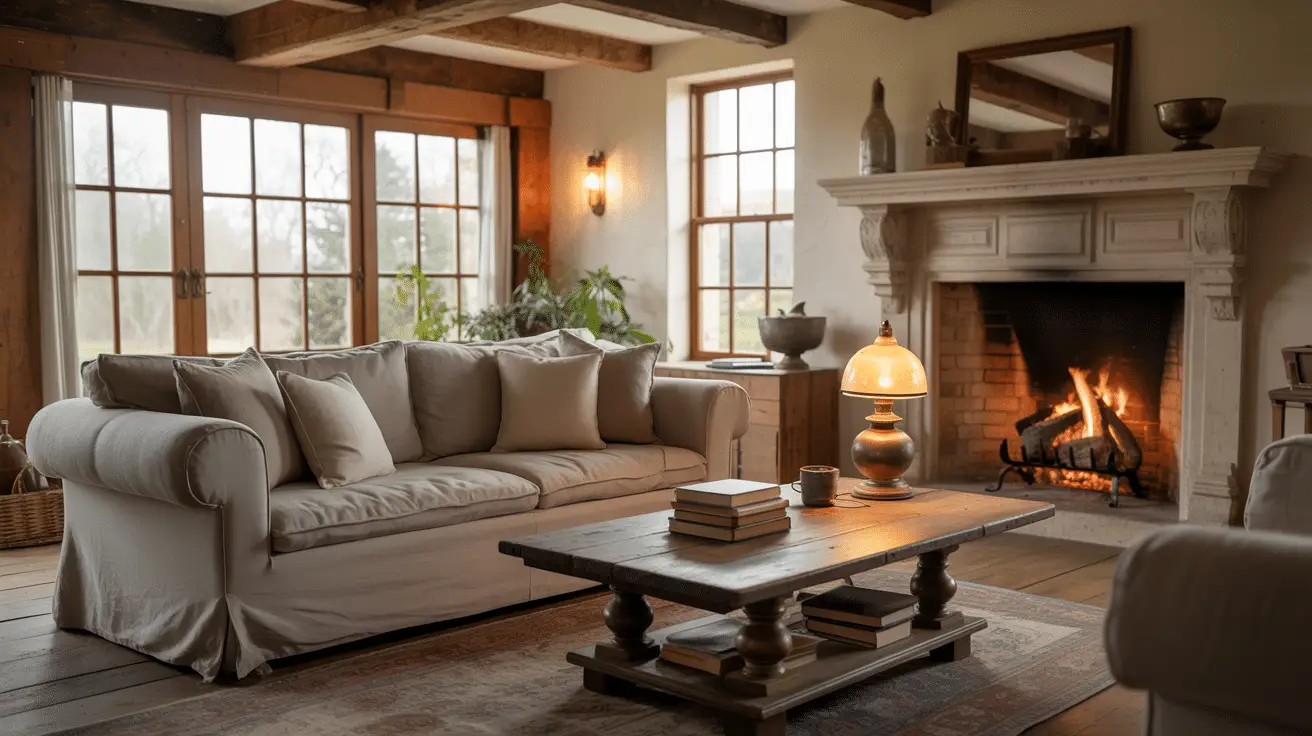Charming Farmhouse Living Room Decor Ideas to Transform Any Home
Table of Contents
Introduction
Imagine walking into a space that instantly feels like home—warm wood tones, soft linen textures, vintage details, and an inviting sense of comfort. That’s the magic of farmhouse living room decor. Whether you live in the countryside or a city apartment, the farmhouse style brings charm, warmth, and personality to any home.
In recent years, farmhouse decor has surged in popularity—and for good reason. According to a 2024 design trend report, farmhouse-inspired spaces consistently rank among the top three most pinned and saved interior styles. Why? Because they blend rustic beauty with practicality, offering a lived-in look that’s both stylish and functional.
This blog post is your comprehensive guide to charming farmhouse living room decor ideas that work for every space. We’ll explore essential elements like reclaimed wood accents, cozy neutral palettes, vintage furniture, and clever styling tips. Whether you want a full makeover or small touches to elevate your space, you’ll find inspiration and practical advice to bring the farmhouse feel into your living room.
Let’s dive into these timeless design ideas that promise warmth, comfort, and endless charm—regardless of your home’s size or location.
Natural Materials: The Heart of Farmhouse Style
At the core of every authentic farmhouse living room lies an appreciation for raw, natural materials. Wood, stone, linen, and metal come together to create an organic yet polished atmosphere that feels rooted and relaxed.
Reclaimed wood beams, shiplap walls, and rustic coffee tables are more than decor elements—they’re storytelling tools. Each knot in the wood, every weathered edge, adds depth and character that synthetic materials simply can’t match. These textures create a tactile richness that makes a space feel warm, lived-in, and timeless.
Stone or brick fireplaces are another hallmark of farmhouse charm. Whether functional or decorative, they offer a grounding focal point in the room, tying together the space with earthy tones and textures.
Layering is essential when working with natural materials. For example, pair a reclaimed wood console with a wrought iron lamp, or drape a chunky knit throw over a linen sofa. These juxtapositions create interest and keep the room from feeling flat.
Table: Key Natural Materials and How to Use Them
| Material | Usage Ideas | Visual Effect |
| Reclaimed Wood | Beams, tables, open shelving | Rustic, warm, vintage |
| Stone | Fireplace surround, accent walls | Textured, grounded, earthy |
| Linen | Curtains, throw pillows, slipcovers | Soft, breathable, casual |
| Wrought Iron | Lighting fixtures, hardware, decorative items | Industrial touch, sturdy |
Cozy Neutrals: Building a Relaxed Color Palette
One of the most distinctive features of farmhouse living room decor is its calming, neutral color palette. Whites, creams, soft grays, and muted earth tones set the foundation for a soothing and inviting space.
The key to a successful neutral scheme lies in layering. While a white wall might seem plain on its own, pairing it with a warm beige slipcovered sofa, a woven jute rug, and antique brass accents introduces subtle variation that’s rich in texture. This layered approach prevents the space from feeling sterile or bland.
Choosing paint colors like “Alabaster,” “Swiss Coffee,” or “Pale Oak” offers a timeless base that complements rustic and modern farmhouse styles alike. Introduce tonal contrast with darker shades like charcoal or slate in accent pieces such as pillows or side tables.
To prevent monotony, texture becomes your color in a neutral room. Think burlap, wool, ceramic, rattan, and distressed wood—each adds a unique depth that brings life to a soft color scheme.
Table: Neutral Color Combinations for Farmhouse Style
| Base Color | Accent Tones | Texture Pairings |
| Creamy White | Olive, Burnt Umber | Linen, rattan, distressed oak |
| Soft Gray | Navy, Clay | Woven cotton, ceramic, wool |
| Warm Beige | Charcoal, Dusty Blue | Burlap, antique metals, brick |

Vintage Finds and Antique Touches That Tell a Story
What sets farmhouse decor apart from other styles is its love for the old and imperfect. Incorporating vintage pieces gives your living room depth, charm, and a lived-in feel that no mass-produced item can replicate.
Look for heirloom-style furniture, like an old wooden chest repurposed as a coffee table, or a faded Persian rug that grounds the room with pattern and age. Even a distressed mirror or a timeworn trunk adds instant character.
Antique stores, flea markets, and estate sales are treasure troves for these pieces. If you’re not sure where to begin, start with smaller decor items—weathered picture frames, vintage books, or a patinaed metal lantern.
The beauty of vintage pieces lies in their imperfections. Scratches, chips, and fading all contribute to their charm. Rather than hide these traits, showcase them—they bring authenticity and warmth to your space.
Table: Where to Use Vintage Elements
| Vintage Piece | Ideal Use in Living Room | Added Value |
| Trunk or Chest | Coffee table or side storage | Functional, full of character |
| Distressed Mirror | Wall decor to reflect light and depth | Adds patina and brightness |
| Woven Rug | Anchor furniture and add pattern | Warmth and vintage texture |
| Antique Clock | Mantel or wall focal point | Nostalgic visual interest |
Comfortable Seating That Invites You to Stay
At the heart of any living room is the furniture—and in a farmhouse setting, comfort is king. The best farmhouse seating is plush, low-maintenance, and subtly elegant.
Slipcovered sofas in neutral shades are a go-to choice. They’re not only cozy and forgiving, but also easy to clean, making them ideal for families or homes with pets. Add depth with throw pillows in varied textures—linen, ticking stripe, cable knit—and a chunky throw blanket for a welcoming, layered look.
Armchairs in leather or soft plaid can complement the sofa and offer visual variety. For a relaxed country vibe, choose furniture with a slightly worn-in or vintage feel.
The layout also matters. Arrange seating to foster conversation and coziness—think a sofa and two chairs around a central table, or a sectional facing a fireplace. Don’t forget a soft rug to define the area and enhance the warmth underfoot.
Table: Farmhouse Seating Essentials
| Seating Type | Best Material | Complement With |
| Slipcovered Sofa | Cotton, Linen Blend | Knit throws, printed cushions |
| Leather Armchair | Aged Leather | Wool pillow, rustic side table |
| Wooden Bench | Reclaimed or Painted | Soft seat cushion, woven basket |
| Oversized Ottoman | Upholstered Fabric | Tray with candles/books |

Rustic Lighting to Set the Mood
Lighting is more than function—it’s mood-setting. In farmhouse decor, lighting fixtures are as much a design element as the furniture itself. Choose pieces that echo rustic, vintage, or industrial styles to complement the overall aesthetic.
A wrought iron chandelier, for instance, adds dramatic elegance when paired with weathered wood beams. Lantern sconces flanking a fireplace or an antique-inspired floor lamp beside a reading chair bring coziness and charm.
Farmhouse lighting often combines metal and glass or aged finishes like oil-rubbed bronze and matte black. Edison bulbs offer a soft, warm glow that enhances the welcoming atmosphere typical of the style.
Layering light is essential. Mix ambient (overhead), task (reading), and accent (mood) lighting to make your space adaptable for all times of day.
Table: Lighting Options for Farmhouse Living Rooms
| Fixture Type | Style Features | Ideal Placement |
| Iron Chandelier | Rustic, traditional | Over seating area or center room |
| Lantern Wall Sconces | Glass + metal, vintage shape | Beside fireplace or entry wall |
| Industrial Floor Lamp | Adjustable, matte finish | Next to reading chair or sofa |
| Table Lamps | Ceramic, wood, or metal base | Side tables, console tables |
Decor Accents That Complete the Look
No farmhouse living room is complete without the right decorative accents. These small touches bring personality and cohesion to the overall design.
Layered textiles—throws, pillows, and area rugs—make the space feel soft and inviting. Wall art featuring vintage signs, botanical prints, or pastoral landscapes adds character and visual interest.
Incorporate organic elements like greenery in terracotta pots or a bowl of pinecones for seasonal variety. Galvanized metal trays, mason jars, and wooden bowls create understated farmhouse charm when styled thoughtfully.
Even everyday objects like books or baskets can be decor when arranged intentionally. Keep the color palette consistent with the rest of the room for harmony and visual flow.
Table: Farmhouse Decor Accents
| Accent Piece | Use & Placement | Visual Effect |
| Woven Baskets | Storage and display on shelves or floor | Natural texture and function |
| Vintage Books | Stack on coffee or console tables | Adds height and warmth |
| Greenery | Mantels, side tables, window sills | Freshness and organic feel |
| Decorative Trays | Group candles or mugs | Keeps items tidy and styled |
Conclusion
A farmhouse living room isn’t just about style—it’s about creating a space where life happens. Whether you’re curled up with a good book, entertaining friends, or enjoying a quiet evening with family, this design approach makes comfort and charm feel effortless.
From natural materials and layered neutrals to vintage finds and thoughtful lighting, each element plays a role in building a space that feels both timeless and personal. With the right mix of texture, function, and warmth, you can bring farmhouse magic into any living room—whether you live in a suburban home, city loft, or countryside retreat.
Let these ideas serve as your inspiration and guide. A welcoming, beautiful farmhouse living room is well within reach—and it all begins with intentional design that speaks to the soul of home.

